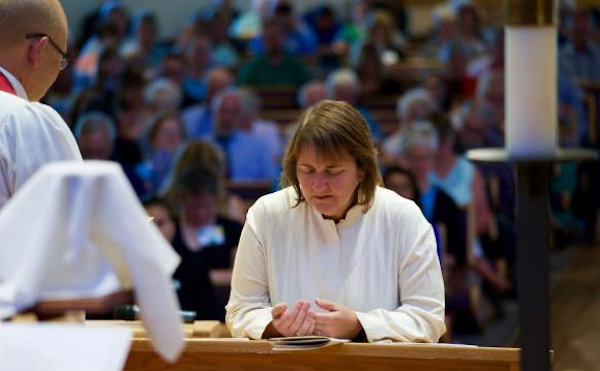This month the UMC's top court will hear arguments concerning the election of Bishop Karen Oliveto.
LINDA BLOOM
United Methodist News Service
An oral hearing on a petition questioning whether a gay pastor can serve as a bishop in The United Methodist Church will open the spring meeting of Judicial Council, the denomination’s top court.
The hearing — set for 9 a.m. Tuesday, April 25, at the Hilton Hotel at the Newark Penn Station in Newark, New Jersey — is the only portion of the council’s April 25-28 meeting that is open to the public.
The petitioner and respondent in the case will have 60 minutes each to present their oral arguments. In addition, members of Judicial Council will have two 15-minute sessions to ask questions of the petitioner and respondent, with a 15-minute break in between the two presentations.
Any decision on that petition could affect Bishop Karen Oliveto, the denomination’s first openly gay bishop, who was elected in July by the U.S. church’s Western Jurisdiction. She currently serves as bishop of the Mountain Sky Area, which encompasses Colorado, Montana, Utah, Wyoming and a church in Idaho.
Oliveto, who was serving as senior pastor of Glide Memorial Church in San Francisco when she was elected, has been legally married to Robin Ridenour, a United Methodist deaconess, since October 2014.
She is facing “multiple” complaints filed since being elected bishop. The Book of Discipline, the denomination’s book of policies, since 1972 has asserted that all people are of sacred worth but that the practice of homosexuality is “incompatible with Christian teaching.”
Since 2004, the book has listed “not being celibate in singleness or not faithful in a heterosexual marriage” and “being a self-avowed practicing homosexual” as chargeable offenses under church law.
Dixie Brewster, represented by the Rev. Keith Boyette, is the petitioner. The respondent is the Western Jurisdiction College of Bishops, represented by Richard A. Marsh.
On July 15, 2016, during the South Central Jurisdictional Conference in Wichita, Kansas, Brewster made a motion that the conference request a declaratory decision from Judicial Council.
Her question was whether “the nomination, election, consecration, and/or assignment as a bishop of The United Methodist Church of a person who claims to be a ‘self-avowed practicing homosexual’ or is a spouse in a same-sex marriage" is lawful under the denomination's Book of Discipline.
The motion by Brewster, a lay delegate of the Great Plains Conference, was passed by majority vote. The South Central Jurisdictional Conference claimed authority to bring the petition because it pertains to matters affecting jurisdictions or jurisdictional conferences.
“Specifically, the petition addresses action by the Western Jurisdiction in electing the Rev. Karen Oliveto, reported to be an openly gay clergy member, as a bishop,” wrote Louisiana Area Bishop Cynthia Fierro Harvey, in a letter to Judicial Council. Harvey was chairing the conference session when the motion was passed.
“Accordingly, the petition will directly affect Bishop Oliveto, her qualifications and the efficacy of her election as bishop,” the letter said. “More generally, the petition will affect all jurisdictions and jurisdictional conferences … who have an interest in the election and appointment of bishops in The United Methodist Church.”
This is one of seven docket items that will be considered by Judicial Council in April. None of the decisions will be released until after the meeting has concluded.
Among other items of business, council members will review the decisions of law related to gay clergy and conference boards of ordained ministry in the New York and Northern Illinois conferences. At its October 2016 meeting, the court ruled that bishops must answer all questions of law that are properly before them.
Bishop Jane Middleton, now retired from the New York Conference, and Northern Illinois Bishop Sally Dyck, submitted their responses before the end of 2016 to Judicial Council, as required.
Also under review is a bishop’s decision of law from the 2016 Northeastern Jurisdictional Conference in Lancaster, Pennsylvania. A “Stop the Trials” resolution — calling for the jurisdiction’s College of Bishops to stop church trials — was debated, amended and “untitled” before being approved by delegates on July 14.
But a clergy delegate from the Eastern Pennsylvania Conference, the Rev. Jeffrey Raffauf, then requested a ruling on whether the resolution was “in order” with the Book of Discipline and several past Judicial Council decisions.
On Aug. 4, Bishop Mark Webb ruled the untitled resolution out of order because it requests that annual conferences and their councils on finance and administration violate church law. The resolution also “negates, ignores and violates the Discipline and Constitution” and is unconstitutional, Webb ruled.
The 2016 General Conference, the denomination’s top legislative body, submitted its own request for a declaratory decision from the court. The petition on the April docket asks if Judicial Council Decision 1318 — which was issued during General Conference and found that mandatory penalties against clergy violate the intent of the just resolution process — applies to Petition No. 60805 in regard to complaints against bishops.
Last Updated on November 9, 2023

